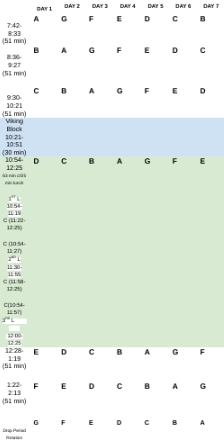Why Homework?
“I do it when I feel like it is necessary,” says an anonymous Triton student.
All of this homework in my backpack is really wrecking my back, ouch.
Today, homework is viewed in two ways, useful and beneficial, or a total waste of time. Many students and teachers believe that written homework should not be given out or graded, while others see homework as their main source of grading. Does homework actually benefit a student or is it just punishment? The answer may be both or neither.
Although they might not admit it to their teachers, many students copy homework answers from other classmates. Sometimes, only one person in the class actually does the homework, and everyone else in the class just copies it from the same person. Personally, I admit to copying homework answers from another classmate, later finding out that pretty much everyone else in the class had done the same thing. There is a pressure to doing homework and students want that pressure gone but don’t want to do the work themselves, so we leech off of one student who is willing to do the work for the rest of us. So, what is the point of homework if no one is learning from it?
I interviewed Triton guidance teacher, Dr. Erik Champy, who attended Austin Preparatory High School. Champy had little to no written homework during his high school experience, and is also not a fan of written homework himself. Champy supports independent reading and studying, but finds written homework to have little effect on a student’s knowledge of a subject. When Champy went to high school, “If we received an A on one assessment, we did not have written homework until the next assessment, which really motivated the students at that time in the early 80’s to study for the tests and really gain the knowledge,” said Champy. The homework system that Champy had in high school is something that would be beneficial for Triton students, and really make them work harder to learn and get good grades.
Homework is also known to be a big contributor to teen stress. A study was taken by Stanford University that found 56% of students considered homework to be a primary source of their stress. Worrying about the grades from homework is the main thing to stress about. If I do not know how to do a homework assignment, I worry about getting a bad grade on it and if it will bring my overall grade down. The same goes for if I miss a homework assignment. If I don’t do it, I worry about how much it will take my grade down. Obviously the solution is to just do my homework, but I don’t see the point in the assignment when I already know the subject and just don’t want to do extra work. This is why some homework just shouldn’t be graded, so the students who want the extra practice can do it- maybe even for extra credit- and the students who don’t want to do it will not be punished.
I also interviewed Triton math teacher, Ms. Heather Walter, who has a complete opposite view of homework than Champy does. Walter thinks that depending on the subject or the difficulty of the class, homework should vary. For the most part, Walter is the only one of my teachers who consistently gives out graded homework. Her analogy on homework made a lot of sense to me when she explained why she gives homework EVERY night. Walter stated, “Some of the topics are difficult, some of them are easier, but with math, you need to practice the skills and things might make sense while we’re doing them together at the board but you may not know whether or not you understand it on your own until you get to do it on your own.”
Some may argue that having homework every night will help further a students knowledge on a subject, and help them practice what they learned in class. This is true, homework is a good way to practice skills learned in class. However, most cases of homework don’t have answer keys or ways to find out if you got the questions right or not. Not having a teacher around when you are doing work can lead to mindlessly doing problems with no real solution, developing bad habits in writing/solving problems, or potentially not learning at all.

Hi! I'm Derek Cotter, a junior at Triton High School.
I like to run track, play the bass guitar, dirt bike, and work with my family at Cotter Brothers...





